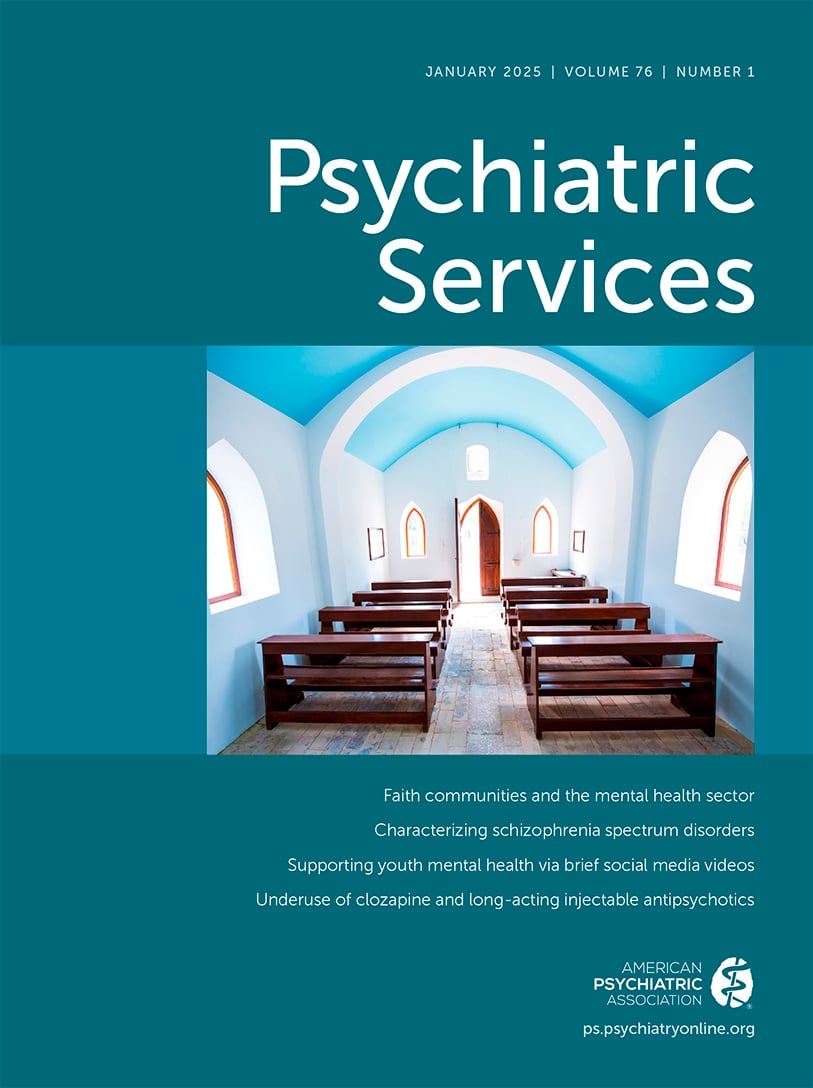Psychiatric Services
- Volume 52
- Number 7
- July 2001
Taking Issue
Departments
Columns
Evidence-Based Practices
Publication date: 01 July 2001
Pages903–910Family psychoeducation is an evidence-based practice that has been shown to reduce relapse rates and facilitate recovery of persons who have mental illness. A core set of characteristics of effective family psychoeducation programs has been developed, ...
https://doi.org/10.1176/appi.ps.52.7.903Other Articles
Publication date: 01 July 2001
Pages911–919Affective syndromes, particularly mania and depression, often occur during the course of illness in patients who have a diagnosis of schizophrenia. Our current diagnostic system allows clear classification of the overlap of affective symptoms and ...
https://doi.org/10.1176/appi.ps.52.7.911Publication date: 01 July 2001
Pages920–924OBJECTIVE: The study evaluated data from a sample of persons with severe psychotic disorders to determine whether those with and without comorbid panic attacks differed in rates of comorbidity of other psychiatric disorders, in quality of life, and in ...
https://doi.org/10.1176/appi.ps.52.7.920Publication date: 01 July 2001
Pages925–934This article is based on the authors' experience in designing and implementing outcomes management systems for large managed care organizations. Topics addressed include design of instruments, use of cost-effective technology, development of computerized ...
https://doi.org/10.1176/appi.ps.52.7.925Publication date: 01 July 2001
Pages935–942OBJECTIVE: The aim of this study was to determine whether it is possible at the time of staff training to predict whether a mental health center will succeed in implementing family psychoeducation services. METHODS: Fifteen mental health agencies in Maine ...
https://doi.org/10.1176/appi.ps.52.7.935Publication date: 01 July 2001
Pages943–948OBJECTIVE: This study examined the prevalence and nature of behavioral health carve-out contracts among Fortune 500 firms in 1997. METHODS: A survey was conducted of 498 companies that were listed as Fortune 500 firms in 1994 or 1995. A total of 336 firms ...
https://doi.org/10.1176/appi.ps.52.7.943Publication date: 01 July 2001
Pages949–952OBJECTIVE: This study replicated an earlier study that showed a linear relationship between level of treatment access and behavioral health spending. The study reported here examined whether this relationship varies by important characteristics of ...
https://doi.org/10.1176/appi.ps.52.7.949Publication date: 01 July 2001
Pages953–958Objectives: This study examined the effects of familiarity with and social distance from persons who have serious mental illness on stigmatizing attitudes about mental illness. METHODS: A total of 208 community college students completed three written ...
https://doi.org/10.1176/appi.ps.52.7.953Publication date: 01 July 2001
Pages959–964OBJECTIVE: To help improve treatment for incarcerated veterans, the study examined exposure to trauma, symptoms of posttraumatic stress disorder (PTSD), functional status, and treatment history in a group of incarcerated veterans. METHODS: A convenience ...
https://doi.org/10.1176/appi.ps.52.7.959Brief Report
Publication date: 01 July 2001
Pages965–967This study assessed the efficacy of the Family-to-Family Education Program, a structured 12-week program developed by the National Alliance for the Mentally Ill. A total of 37 family members who participated in the program were evaluated by an independent ...
https://doi.org/10.1176/appi.ps.52.7.965Publication date: 01 July 2001
Pages967–969This study evaluated the effectiveness of a Weight Watchers program for patients with schizophrenia who had olanzapine-related weight gain and ascertained whether the severity of patients' psychiatric symptoms was correlated with the patients' success in ...
https://doi.org/10.1176/appi.ps.52.7.967Publication date: 01 July 2001
Pages970–972This paper describes a day treatment program that provides predominantly cognitive-behavioral therapy for a heterogeneous group of patients. Preliminary results of the program are also presented. Assessment tools included the Beck Depression Inventory, ...
https://doi.org/10.1176/appi.ps.52.7.970Frontline Reports
Letters
Book Reviews
Book Reviews: Dictionaries and Timelines
Book Reviews
News & Notes
Past Issues
View Issues Archive
Vol. 76 | No. 1

Vol. 75 | No. 12

Vol. 75 | No. 11
